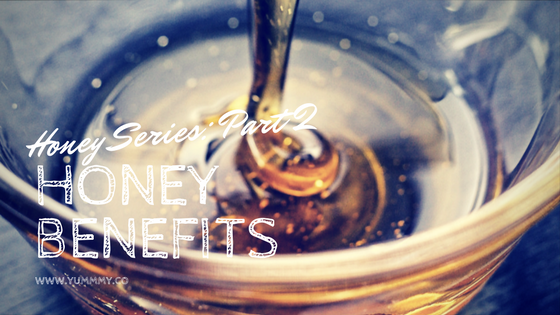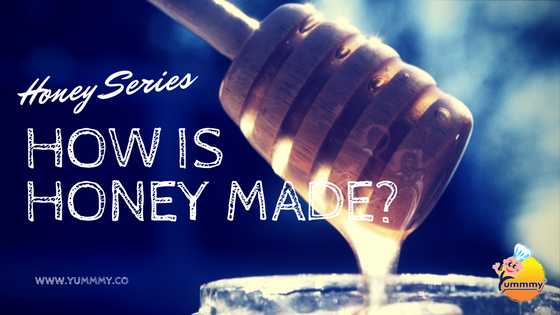Honey Series: Benefits of Honey
1/28/2021
Many of us know all about honey as a natural remedy for a sore throat, but did you know that honey can help with your allergies, increase energy and memory, boost your immune system and even help with dandruff? The average composition of honey is approximately 80% carbohydrates, 18% water, and 2% vitamins. The vitamins included are calcium, copper, iron, magnesium, manganese, phosphorus, potassium, sodium and zinc Each tablespoon contains 64 fat-free, sodium-free, and cholesterol-free calories. Now that’s a guilt-free pleasure! Raw honey offer many benefits due to its rich nutritional content. It contains minerals, vitamins, amino acids and flavonoids and phenolic acid which act as antioxidants. The nutrition varies depending on the floral variety of the honey but are pretty similar. Some of the benefits include: Energy booster Instead of drinking an energy drink that’s full of refined-sugars and high fructose syrup, take advantage of honey’s natural source of carbohydrates to fuel your body, which has demonstrated to provide the same kind of energy boost as energy drinks. Honey maintains muscle glycogen (stored carbohydrates), giving athletes the boost they need when they need it most. Sleep Aid Ditch the fatigue and crankiness due to a lack of rest with honey. Taking a spoonful of honey before bed can help you get a good night’s rest. The reason for this is that the sugar in honey raises your insulin level allowing tryptophan, an amino acid that makes us sleepy, enter your brain more easily. Reduces allergies Honey contains small amounts of pollen from the bees. This pollen allows you to trace the origin of the honey and discover its floral variety. But by consuming the pollen, it enables you to get your body accustomed to pollen that aggravates your allergies. It works like a vaccine; the pollen enters your body and your immune system attacks and kills it, and build up immunity at the same time. To take advantage of this, it’s important to consume local honey since it will contain the pollen found in your community that causes your allergy and it is recommended to consume local raw honey (unfiltered and unheated honey to ensure the pollen hasn’t been filtered out) 2 months before allergy season. Beauty aid Due to honey’s anti fungal and antibacterial properties, it is a great remedy for scalp issues like dandruff and skin lesions. If you have a minor abrasion, simply dab a little honey and the thickness of the honey will protect against bacteria and dirt affecting the cut. For your hair, just dilute honey with water or mix with olive oil, apply and leave for a few hours. It will not only help with your scalp issue but also moisturize your hair. Honey is also used to moisturize your skin and can be used as a moisturizing exfoliator by simply adding sea salt or rolled oats to the honey and apply to your body. Sore throat soother and cough suppressant The World Health Organization (WHO) identifies honey as a potential demulcent (relieving inflammation or irritation) for cough so during the harsh winter months, stock up on honey to help reduce cough and alleviate sore throats. Please note, do not give honey to children less than a year old. Their digestive system isn’t mature enough to ingest honey. As with any food, we recommend to use honey with moderation due to its high level of fructose. Remember moderation is key to living a healthy and natural life! You can find Yummmy’s Florida Raw Honey, which is unfiltered and unheated, in a variety of sizes directly on Amazon and in local South Florida stores including Sedano’s, Winn-Dixie and Fresco y Mas. Please contact your local store for availability.
0 Comments
Honey Series: How is honey made?
8/17/2017
Honey has a history as old as time symbolizing abundance and power. In fact, the promise land that God had for the Israelites was described as a land flowing with milk and honey. The bee has also been used as an emblem of power. The Egyptians used the bee to symbolize royalty and was the sign of the king of Lower Egypt during the First Dynasty (3,200 BC), and Napoleon’s robe was embroidered with bees.
We cannot know for a fact how long honey has been in existence, but cave paintings from 7000 BC in Spain show records of beekeeping. As one can imagine, honey has taken many forms of use throughout its history. For example, honey was used to develop an alcoholic drink called Mead, which was considered to be the nectar of the gods. It was also used to make furniture polishes, varnishes and for medicinal purpose, just to name a few. But after discovering all its benefits and uses, one can’t help but wonder, how is honey made? Honey is produced by worker bees, which are the smallest bees in the colony and are non-reproducing females. Bee experts state that it takes 60,000 honeybees traveling to about 2 million flowers (55,000 miles) to make 1 pound of honey. Therefore, an average worker bee will make only one-twelfth of a teaspoon of honey in its lifetime. Bees have two stomachs - one for eating and another to store the nectar collected from flowers. The bee regurgitates it into the honey comb until the nectar is partially digested. Then, the bees fan the liquid nectar to make it thicker and remove humidity. Finally, the bee seals the nectar with a liquid it secretes from its abdomen, which hardens the nectar into beeswax. Beekeepers then go into the hive collecting the honeycomb frames and scrape off the wax that the bee made to seal off the honey. Then, they place these frames in a centrifuge that spins the frame to take out the honey from the comb. After the honey is extracted, it’s strained to remove any remaining wax, bottled and labeled, and sent to market for you to consume. With such a lengthy process and effort, it’s no wonder that the bee has won the admiration of so many throughout its history. |
About the authorMy name is Camila, and I curate recipes from the web, friends and family to share them with you! I love food but I'm learning to cook so I can keep enjoying this pleasure! Recipes featuring you
How do you use our Yummmy products? We'd love to know how you create delicious recipes with our products. Send us your recipes for a chance to be featured in our site! |


